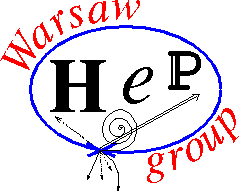Dnia 27 lutego (piątek) o godzinie 11:30, w sali B2.38 odbędzie się seminarium, na którym zostanie wygłoszony referat pt.:
„Information-Geometric Approaches in High-Energy Physics”
Referuje: dr Alibordi Muhammad (IFD UW)
In this talk, I will explore how concepts from information geometry can provide new insights into complex phenomena in high-energy physics. I will present two illustrative examples: (1) a product manifold approach in machine learning that enhances classification performance for Vector Boson Fusion decays, and (2) a reformulation of CP violation from an information-geometric perspective. Finally, I will discuss potential applications of these techniques in the upcoming Phase-2 upgrade of the CMS experiment.
Serdecznie zapraszamy
dr hab. Katarzyna Grzelak
prof. dr hab. Aleksander Filip Żarnecki

